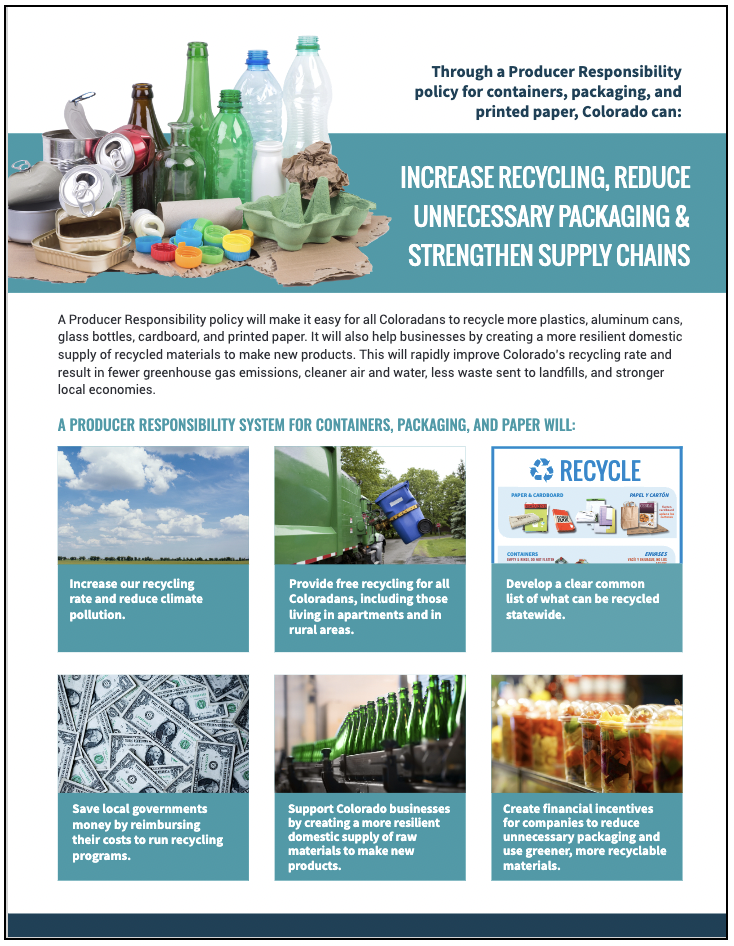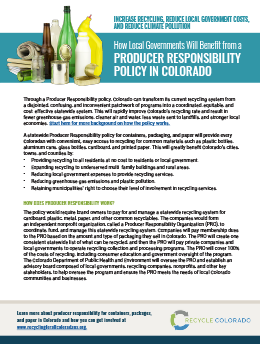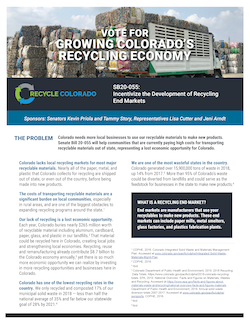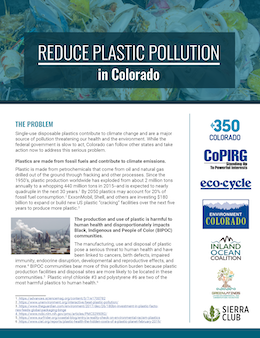Community-Based Zero Waste Change
Eco-Cycle is dedicated to building Zero Waste communities across Colorado and beyond. While each community may start in a different place with regard to waste reduction, recycling, and composting, there are basic rungs in the Zero Waste ladder they can climb to help Colorado reach its waste diversion goals. Eco-Cycle uses best practices from around the world to work with communities and help them advance up the ladder.
Recent Community Campaign Victories
Fort Collins Disposable Bag Ordinance
In 2021, with the help of Eco-Cycle, voters in the City of Fort Collins passed a ban on plastic bags and a fee on paper bags in grocery and large retail stores, making Fort Collins the 17th community in Colorado to regulate single-use carry-out bags.
Plastic pollution such as plastic bags are a widespread problem across the country, and the City of Fort Collins wanted to reduce the number of plastic bags showing up in its open spaces and the Cache la Poudre River and watershed. Eco-Cycle provided consulting to the City on the best practices in designing plastic bag ordinances and, in February 2021, the City Council passed an ordinance to ban single-use bags that was contingent on approval by the voters during the April municipal elections. Eco-Cycle worked with the local chapters of the Sierra Club and the Climate Reality Project to put together a grassroots campaign to educate voters on the importance of approving the ordinance, including hosting virtual meetings with community groups, developing fact sheets, and distributing materials to voters’ doors. The ordinance was passed by 59% of voters, which means that as of May 1, 2022, large grocers are prohibited from distributing plastic single-use carry-out bags and now charge $0.12 for disposable paper bags to encourage the use of reusable bags. The fee does not apply to people who use food assistance programs and the city plans to distribute free reusable bags to residents.
Louisville Disposable Bag Tax
In November 2020, after a groundbreaking campaign led by students, voters in the City of Louisville approved a measure to charge a $0.25 tax on both plastic and paper disposable bags at all retail stores, effective January 1, 2022.
According to the City of Louisville, the city uses 4.5 million bags totaling 25 tons per year. Mayor Ashley Stolzmann and members of the city council voted to place a measure on the 2020 ballot establishing a tax on disposable bags as an opportunity for the community to reduce its plastic waste. In response, a small group of students from second graders up to college students organized to support the measure, with Eco-Cycle advising them on ways to raise awareness about the importance of addressing plastic waste. Because of the COVID pandemic, the students had to be creative in their campaign approach, which included videos, sidewalk chalk art, handmade yard signs, and a student-led virtual town hall.
Their hard work paid off on November 3, 2020, when Ballot Measure 2A—the single-use checkout bag tax—passed with 62% of the vote in Louisville. As a result, effective January 1, 2022, the city now charges a $0.25 tax on all disposable bags—both plastic and paper—at all retail stores, making Louisville the 16th community in Colorado to pass a bag ordinance. While other waste-related policy initiatives in Colorado may have involved students, this is the first one that has been led, organized, and implemented almost entirely by students. Their volunteer efforts brought attention to an important issue and their perseverance led to the successful passage of the bag tax measure.
Arvada Organized Waste Hauling
In June 2020, Arvada contracted with one hauler to provide both recycling and trash services to 32,000 single-family homes, the largest city-wide hauling contract in Colorado, which will provide recycling at no additional cost to every single-family home in Arvada.
One of the biggest recycling challenges in Colorado is the lack of a unified or organized local waste collection and management system. For instance, the City of Arvada, the seventh-largest city in Colorado, with a population of over 121,000, formerly had seven haulers providing trash and recycling services to residents, which meant that many collection trucks could be going up and down one street every week. This inefficiency in providing waste collection services increased the cost of recycling to Arvada residents, only 40% of whom had curbside recycling services, resulting in the city recycling only 13% of its waste—one of the lowest recycling rates in the Front Range.
Eco-Cycle provided consultation services to help the City develop a proposal to transition to an organized waste hauling system that was adopted by City Council in June 2020. Eco-Cycle was also heavily involved in educating the public and engaging residents to support the new measure. The newly adopted system contracts with a single hauler, Republic Services, to provide trash and recycling services to single-family homes using volume-based pricing for trash (in which service rates depend on the size of the trash cart) with recycling bundled into the total service cost. The new program began July 1, 2021, making the City of Arvada the largest city in Colorado to contract a single hauler for waste and recycling. As a result, Arvada’s recycling rate is expected to increase dramatically.
Boulder Universal Zero Waste Ordinance
In 2015, the City of Boulder became one of only three cities nationwide to adopt a Universal Zero Waste Ordinance requiring all residents, businesses, and multifamily complexes to have both recycling and composting services.
Despite its sustainability ambitions, back in 2015, the City of Boulder’s waste diversion rate was stalled at a mediocre 32%, well below its goals. While Boulder residents were recycling and composting 48% of their waste, businesses were only recycling and composting 28%, despite years of the City providing incentives to encourage businesses to improve their waste diversion. Consequently, Eco-Cycle advocated to City Council that it was time to level the playing field and require all businesses and multifamily complexes to recycle and compost. Eco-Cycle’s network of 1,000-plus volunteer Eco-Leaders organized a groundswell of grassroots support, including letters to the editor, emails to council, and testimony at council meetings. In response, in June 2015, the Boulder City Council adopted a Universal Zero Waste Ordinance requiring all residents, businesses, and multifamily properties to have both recycling and composting services, becoming the third city in the nation to do so. Thanks to Eco-Cycle’s community education and advocacy, there was no public opposition to the ordinance.
Boulder’s Universal Zero Waste Ordinance has been in effect since 2016, resulting in an increase in the community-wide recycling and composting rate to 53% and catapulting the city back into the role of a leading Zero Waste community.
Boulder Disposable Bag Fee
In November 2012, City Council adopted a Disposable Bag Fee Ordinance requiring a 10-cent fee for disposable plastic and paper checkout bags at all grocery stores in Boulder. The bag fee does not apply to restaurants, bulk or produce bags, newspaper bags, or any other kind of food packaging bags. At the time of adoption, Boulder used approximately 33 million checkout bags a year, or about 342 bags per person each year
Boulder saw a 70% decrease in plastic bag use immediately following the implementation of the bag fee, however, that trend leveled off quickly. As of early 2018, the fee had collected approximately $1,000,000 since it went into effect in 2013.



























